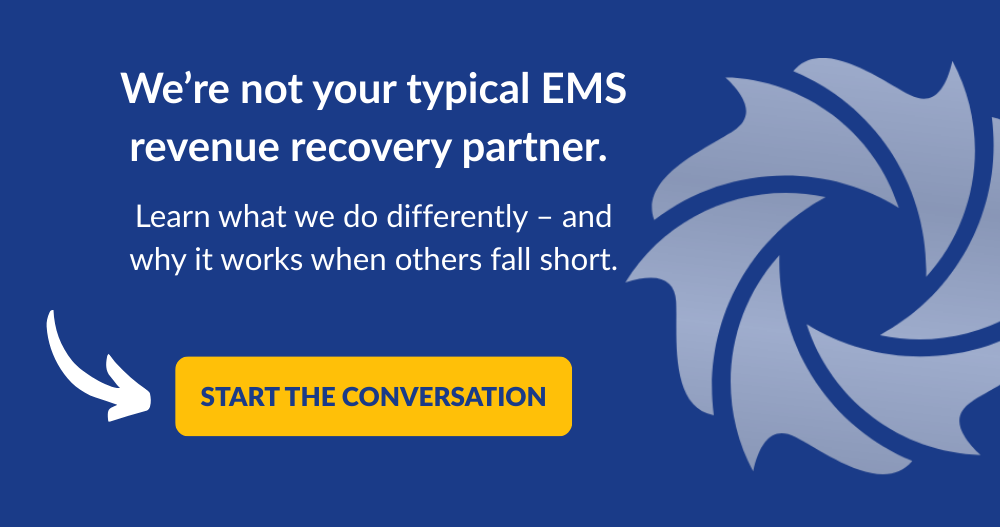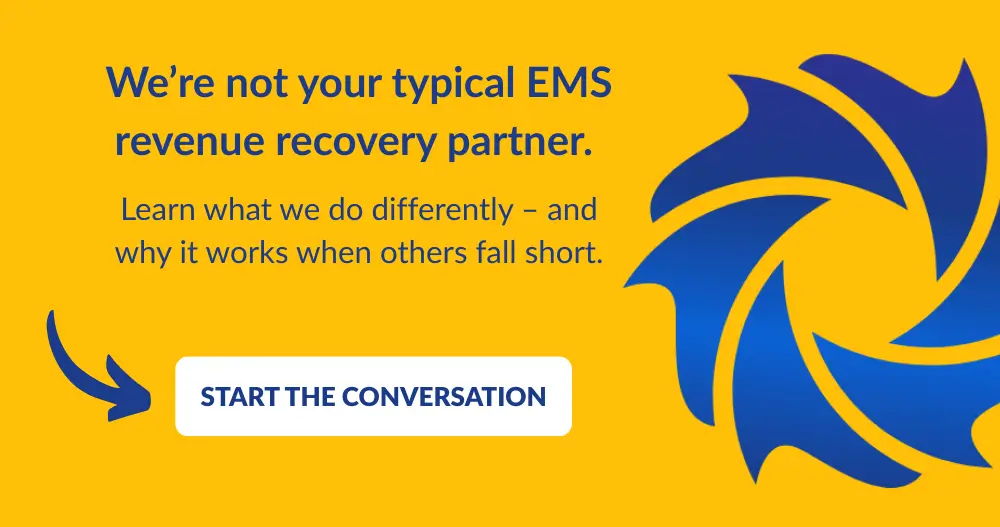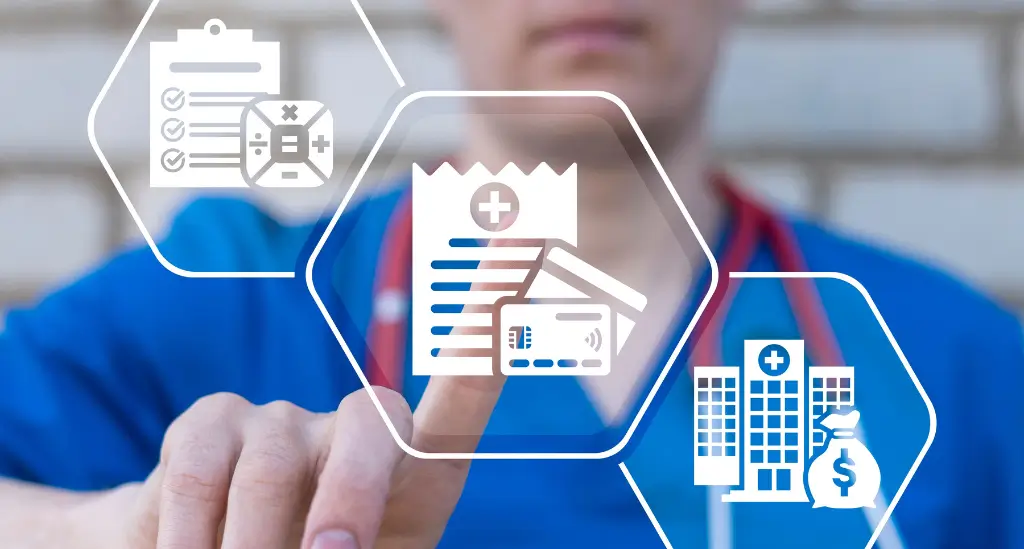Emergency medical services teams provide some of the most essential, high-stakes medical services in our entire healthcare system. And yet, they’re routinely the last to get reimbursed.
The call comes in, and your crew responds without hesitation. There’s no intake process, no front desk, no time to verify coverage or collect signatures. Sometimes there’s no ID at all. By the time the claim goes out, key details may be missing – and insurers are already lining up any number of excuses not to pay.
Now you’re stuck chasing a payment that will probably never come, watching it quietly disappear into the black hole of aged accounts receivable before finally deciding to send it to collections and hope for the best.
As you know well, EMS services face an even steeper reimbursement hill than other providers. You’re not operating in clean, controlled settings. You don’t have a pre-appointment team collecting insurance cards or verifying coverage before care is delivered. Your crews are responding to chaos – on highways, in homes, in parking lots at 3 a.m. – and insurers are quick to exploit it. Missing patient info becomes a denial. A slightly messy chart becomes an excuse to downgrade or delay. And when you push back, you’re met with silence, stall tactics, or boilerplate rejection codes.
Even if you’ve invested significantly in billing processes, staff training, or software enhancements, we’re willing to bet there’s still money slipping through the cracks. Denials that go unchallenged. Claims dropped for missing patient info. Patient balances ballooned by insurance cost-shoving, now dumped back on your team to chase.
That’s where we step in.
Strategic Claims Processing that Stops Denials in Their Tracks
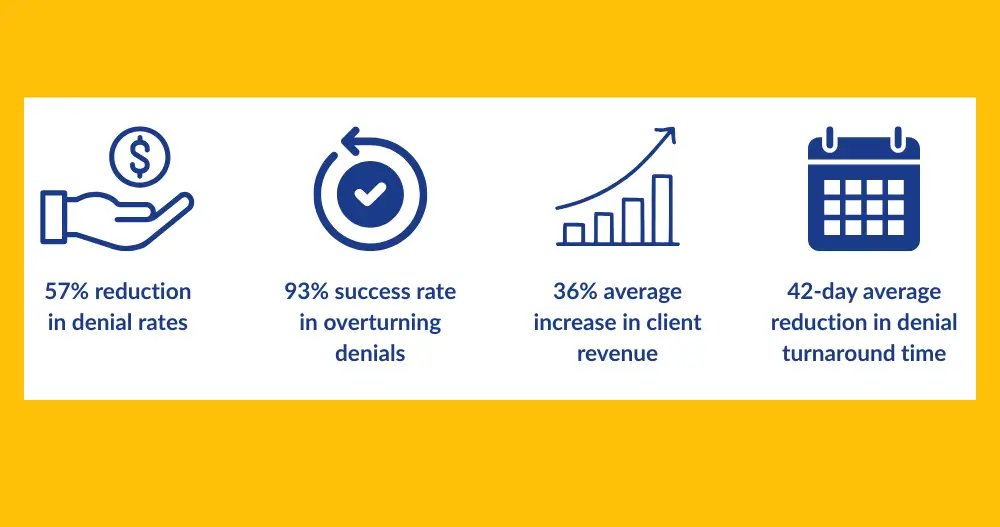
Insurance companies are banking on you giving up. They know EMS providers face more complex and chaotic situations compared to other medical services, and they exploit this fact to deny valid claims, stall reimbursements, and inflate profits at your expense.
Increasingly, insurers leverage automated systems and artificial intelligence to issue rapid-fire claim denials, betting that overstretched EMS billing departments will lack the time or resources to fight back. The good news is that fighting back is precisely where we excel.
Our denial management process goes far beyond templated appeal letters and routine phone calls. We combine targeted human expertise with powerful analytics to aggressively and efficiently overturn denials:
Strategic Denial Forensics: Our team meticulously examines each denied claim on an individual basis, uncovering subtle insurer tactics specifically designed to stall or reduce payments. Rather than simply recording denial reasons, our experts carefully dissect each case to identify unjustified medical necessity rejections, intentionally vague coding disputes, and strategic demands for redundant documentation. This precise, hands-on analysis allows us to craft highly targeted, compelling appeals insurers can’t easily dismiss.
AI and Data-Driven Countermeasures: We complement our individual claim analysis with advanced analytics that identify broader denial patterns across thousands of claims. By recognizing insurer behaviors and tactics at scale, we proactively anticipate future denials, strategically enhancing claim documentation, coding accuracy, and appeal content before insurers even respond. This data-driven approach allows us to stay ahead of insurer strategies rather than simply reacting to them after the fact.
Relentless Follow-up: Insurers rely on attrition, hoping you’ll tire of repeated denials and confusing communications. But we don’t give up that easily. Our dedicated follow-up processes escalate claims strategically, applying continual pressure until rightful payments are secured.
Lowering Your Cost to Collect: By addressing denials in this strategic and methodical way, we streamline processes and thereby reduce your overall cost to collect. Our methods ensure you receive more payments sooner, reducing the amount you spend chasing down balances.
All told, our comprehensive denial management system makes us fundamentally different from typical EMS revenue cycle partners. Our process, honed over two decades of overcoming insurance corporation tricks, dismantles insurers’ denial strategies to deliver tangible results that significantly improve your cash flow and maximize revenue.
What RCM Systems Miss, Our Advanced Tracing Finds
Some claims never make it out the door due to missing or incomplete insurance verification – no patient details, no ID, no one on scene to confirm coverage. Other claims go out, but when the insurer denies it or pushes the cost to the patient, the trail goes cold. Maybe the address is wrong. Maybe the hospital records don’t line up. Maybe the patient was unconscious, with no ID. Whatever the gap, the result is the same: The claim sits idle, and the balance goes uncollected.
Many workflows stop here; for us, it’s where we’re just getting started.
We use a range of advanced contact strategies that go well beyond basic templated letter cycles and routine call attempts. Leveraging skip-tracing tools, we access multiple public and proprietary databases to cross-reference details, rebuild accurate patient profiles, and secure reliable contact information – including current addresses, working phone numbers, verified emails, and optimal call times to maximize connection rates. Our methods are particularly impactful in billing related to ALS transports, where, in our experience, up to 25% of addresses and 45% of phone numbers provided are incorrect or outdated.
This robust approach significantly improves patient-pay collections, but it provides another critical benefit as well; it helps us locate patient insurance information, substantially boosting your overall reimbursement.
These efforts matter most during the early out window, when patient responsibility is still fresh and recoverable. That’s when you need more than a couple of boiler-plate letters and a half-hearted phone call. The earlier we intervene, the more likely we are to resolve the balance and avoid sending it into bad debt or writing it off entirely.
It’s not always glamorous work, but it’s necessary; especially for ambulance services, where the chaos of a scene can mean the clean data just isn’t there. Thanks to our concerted efforts, we routinely track down and re-engage patients that other vendors or internal teams have written off as unreachable.
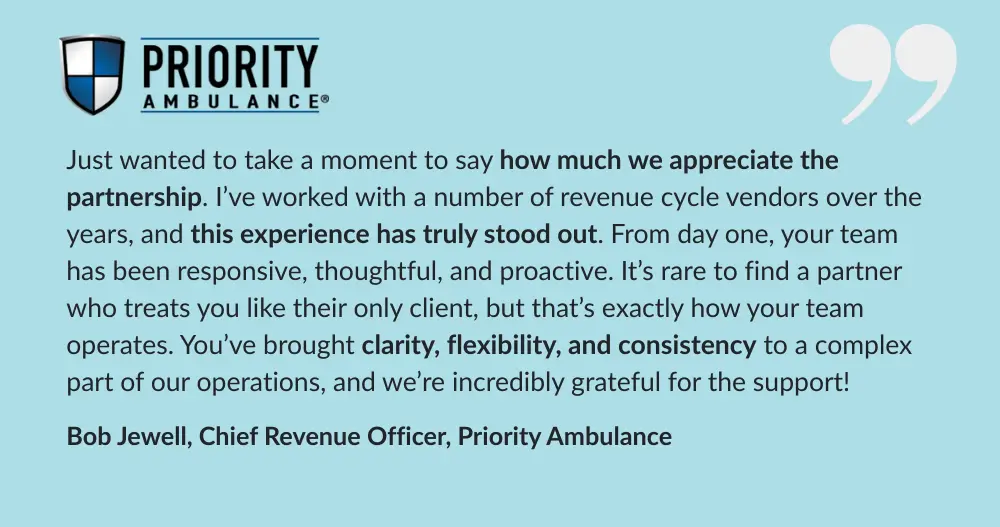
Optimizing Cash Flow with Strategic Early-Out Collections
We understand the unique challenges of collecting payments for ambulance transports. Many patients didn’t request the transport themselves, question whether it was necessary, assume insurance would cover it, or are simply shocked by the cost.
Our three-step early-out process is designed to overcome these barriers and deliver results:
Engage: We reach patients through their preferred communication channels, whether phone calls, mailed statements, text messages, or email. We leverage our skip tracing tools to locate updated contact details, including phone numbers, email addresses, and physical addresses when needed.
Empathetic Collections: We approach every conversation with empathy. Patients are often confused by their bills. This isn’t necessarily because they’re unwilling to pay, but because insurance companies have made healthcare billing nearly impossible to understand. We work to build trust and resolve concerns respectfully.
Educate: Once a connection is made, we help patients understand why the balance is their responsibility (typically due to decisions made by their insurance company). We remind them that you’re not printing money; you’re providing essential, life-saving care that deserves fair compensation.
Time and again, client after client, we’ve found that our approach both significantly improves your collection rates, as well as brings you higher patient satisfaction scores and stronger Google reviews.
We Keep Your Revenue Cycle Moving, Bad Debt And All

If you’re coming to us with existing bad debt, you’re not alone. Many EMS providers come to us with a backlog of unresolved accounts. These might be balances that were never followed up properly, rushed to collections before early-out efforts were complete, or written off internally despite having recovery potential.
We’ve got you covered.
Using the same core tools that drive our early-out success – strategic tracing, respectful patient engagement, and precise communication – we recover aged accounts without resorting to aggressive, reputation-damaging tactics. Our team is trained to meet people where they are, explain the balance clearly, and protect your public image while recovering what you’re owed.
Our results speak for themselves: Over $1 billion recovered since 2003, and hundreds of 5-star patient reviews along the way. Learn more about our innovative and patient-centered approach to medical debt recovery.
In EMS Revenue Cycle Management, Every Reimbursement Counts
While most revenue teams focus on larger denials and patient balances, plenty of damage comes from the low-dollar claims that quietly fall outside the standard workflow. Whether it’s a $48 balance after insurance, a short-trip denial, or a patient responsibility that never got a second notice, many billing teams or vendors overlook them.
But they add up fast.
We’ve recovered a good deal of revenue from balances that were flagged as “not worth pursuing,” because we don’t ignore claims based on size, whether on the payer or the patient side. If it’s valid and recoverable, we’ll go after it. After all, how many $48 payments are slipping out your door every month?
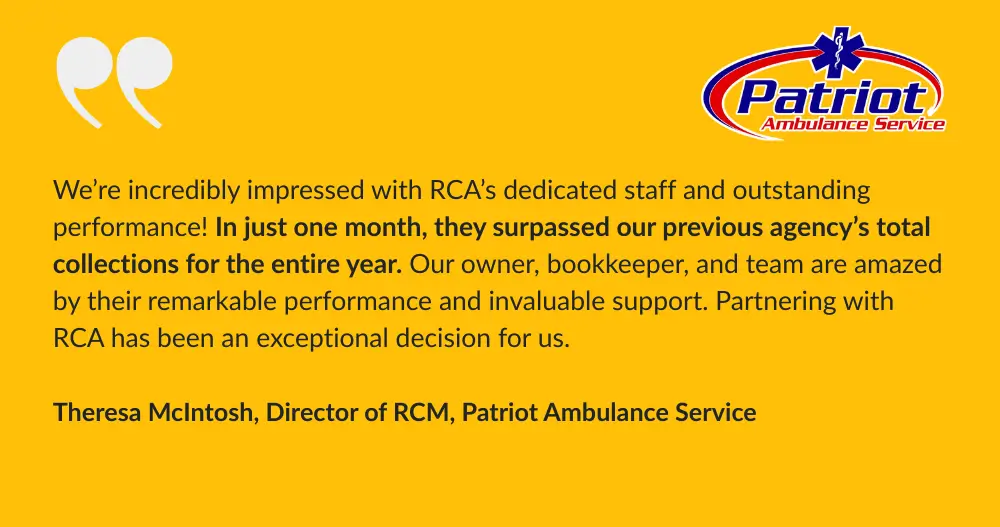
Already Have a Revenue Cycle Partner or EMS Billing Software?
You may already be working with another revenue cycle partner – maybe even an ambulance-specific one – or using specialized EMS billing services software. If so, you’ve likely gone a long way towards streamlining claims submission, maintaining compliance, and reducing internal administrative burden.
But even when strong systems are in place, we still often find critical gaps.
Most billing platforms, and even many high-volume RCM firms, are optimized for efficiency. That means templated appeals, pre-set follow-up cycles, and automated thresholds that often let low-dollar or incomplete claims quietly slip through the cracks.
We integrate with your existing platform – Zoll, Rescue Net, Traumasoft, ESO, and others – to uncover and recover what others miss. Our detailed audits catch auto-dropped claims that deserve another look, while our specialized denial experts meticulously review insurer rejections to build tailored, effective appeals. Our advanced tracing teams go further still, locating critical patient information and insurance details for claims previously deemed unrecoverable due to incomplete or incorrect data.
Many of our EMS clients continue using their existing solutions to manage the front-end billing process, while bringing us in to strengthen the recovery side. Others, after seeing what we’re able to uncover and collect, choose to hand over the full revenue cycle.
However you choose to work with us, the goal is the same: Maximize your reimbursements so you can continue to do what you do best – provide a life-saving response when every second counts.
Final Note: Working Toward True Systemic Change for EMS Providers
We know the challenges EMS agencies face are systemic, baked into an unfair reimbursement system that puts insurance corporation profits front and center.
That’s why, alongside our revenue recovery work, we also advocate for structural change. Through our in-house research and policy division, we conduct studies, publish data, amplify provider voices, and work toward reforms that bring more transparency and fairness to the process.
Right now, our advocacy efforts are primarily focused on basic government oversight of Medicare Advantage plans, which, unlike traditional Medicare, operate with virtually no meaningful accountability. The current lack of oversight hits EMS hard. We’re seeing more denials for medically necessary transports, reduced rates for out-of-network care (even in true emergencies), and higher patient responsibility that leaves providers chasing balances instead of getting paid.
To address this issue and alleviate the financial and emotional strain on healthcare providers systemwide, we’re working with legislators to create an independent oversight board that can finally set baseline rules for fairness, consistency, and timely payment.
As part of this work, when we meet with lawmakers we also emphasize that ambulance services are a non-negotiable part of our healthcare and emergency response systems, especially for vulnerable populations like seniors on Medicare and individuals covered by Medicaid. We share data and firsthand experience from EMS providers, showing how proposed cuts to Medicaid supplemental payment programs threaten the financial stability of these services – particularly in rural areas – jeopardizing access to life-saving care. We’re urging lawmakers to protect and fully fund these programs, so that ambulance providers can continue serving communities in need.
And we’re always listening. Our founder, Mark Craig, is deeply involved in both the recovery and advocacy sides of this work – and he’s interested in hearing what providers are dealing with firsthand. If you’ve got a story to share, a frustration to vent, or a pattern you think others are missing, we encourage you to give him a call and share. These conversations help shape the work we do; and they’re often the first step toward real change.

